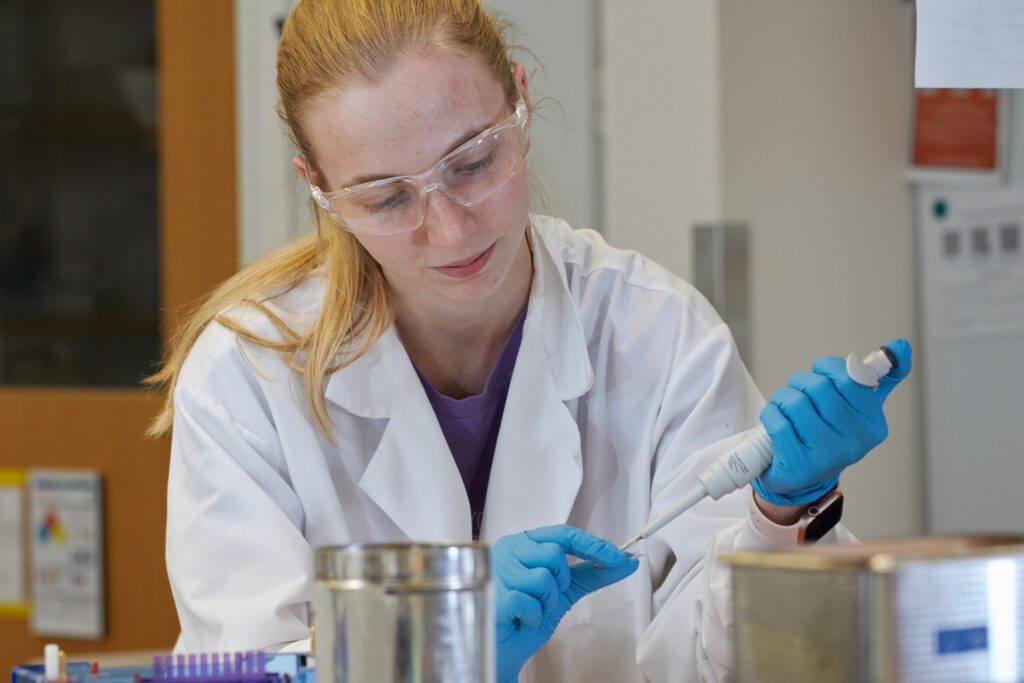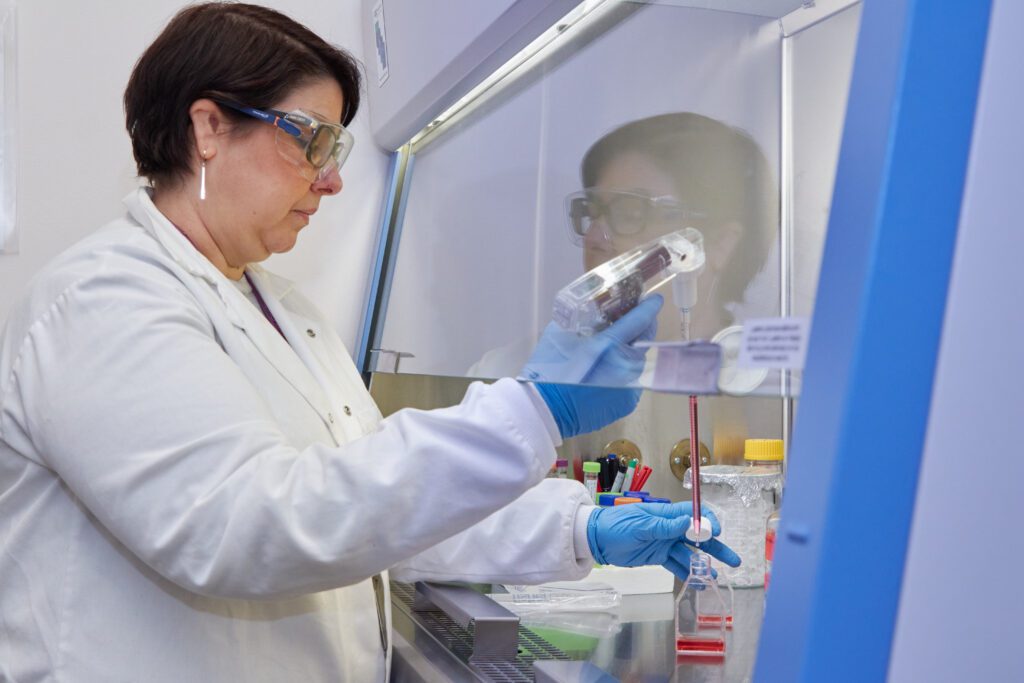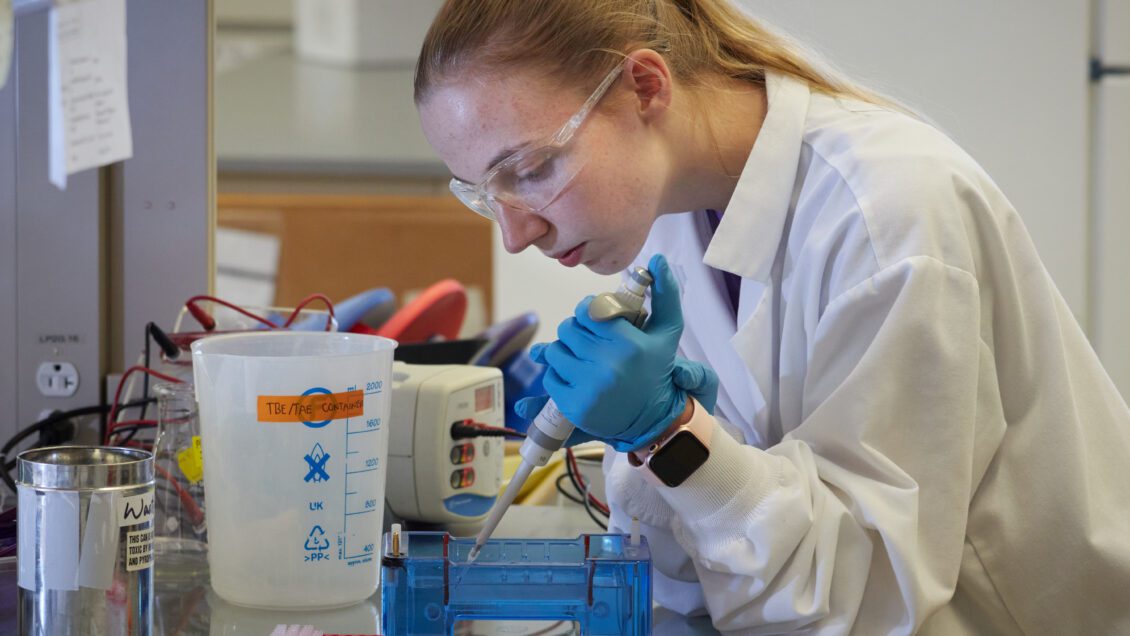Hands-on work in Clemson labs is what sets young researchers apart for post-graduate opportunities.
Gracie Dellinger has spent three years in Kim Paul’s lab at Clemson University’s Eukaryotic Pathogens Innovation Center trying to better understand fatty acid metabolism in the pathogen that causes African sleeping sickness.
What makes that unusual?
Dellinger is an undergraduate student working on degrees in genetics and microbiology.
“That’s not the research undergraduates typically get to do. It is super helpful because it sets me apart as a student to do this level of research,” she said.

Dellinger was in high school when she first worked with Paul, an associate professor in the Department of Genetics and Biochemistry and a founding member of EPIC. Dellinger attended the South Carolina Governor’s School for Science and Mathematics, and students there are required to participate in a six-week summer research program between their junior and senior years. Dellinger was randomly assigned to Paul’s lab. She rejoined the lab during her first year at Clemson.
“It’s helped me develop essential skills that some people don’t get until graduate school. It has given me a better understanding of topics in my field, far more in-depth than the typical student would learn,” said Dellinger, who plans to pursue a Ph.D. after she graduates from Clemson.
During its first decade, EPIC has trained undergraduates, graduates, postdoctoral fellows and medical students. EPIC has graduated 32 doctoral students, many of whom have gone on to prominent postdoctoral positions. The undergraduates who have performed research in EPIC frequently attend prestigious graduate or medical schools.
There are currently nearly 150 postdoctoral fellows and research technicians, graduate students and undergraduate students working in the 15 labs that form EPIC.
Training is what we do. EPIC is about training students to be the next generation of scientists. Who knows what discoveries they’ll make in the future?
Kerry Smith, director, Eukaryotic Pathogens Innovation Center
EPIC is why Melanie Key, a fifth-year Ph.D. student in microbiology, came to Clemson.
“I was interested in studying pathogens, eukaryotic cells as a change from what I was initially studying for my undergraduate research, which largely focused on pathogenic bacteria,” said Key, who earned her undergraduate degree in biological sciences at Auburn University. “EPIC looked like a good networking environment and somewhere where I could learn from other scientists specializing in this field of research.”
She is studying Toxoplasma gondii, a microscopic protozoan that has pregnant women avoiding cat litter boxes. The pathogen invades and replicates inside human host cells and can cause potentially lethal disease in immunocompromised individuals. To survive inside the host, it needs to acquire certain nutrients from its host. Key’s work focuses on finding the parasites’ pathway to access two potential energy sources, lactate and pyruvate — metabolites produced by the host’s glycolysis pathway, a series of reactions that extract energy from glucose.

Through EPIC, Key has access to equipment that otherwise would not be available, career advice and networking opportunities.
“It’s a friendly environment to bounce ideas off your peers. Every week, we have an EPIC club meeting where labs have their students present their research, and other PIs [principal investigators] and other students give feedback. It’s a very helpful, collaborative environment to work in,” she said.
This summer, students from two medical schools in the Upstate will conduct laboratory-based research through the MEnTOR (Medical Enrichment Through Opportunities in Research) program, the first and only National Institutes of Health training grant at Clemson.
“Over the last few years, engagement in research during medical school has become more important for our students. Many students know they need to understand the research process for specific residency programs. Others want to continue research during their careers as a physician,” said Renee J. Chosed, associate professor of biochemistry and director of medical student research at the University of South Carolina School of Medicine Greenville.
John King, a student at USCSOMG, and Ashleigh Walsh, a student at the Edward Via College of Osteopathic Medicine-Carolinas in Spartanburg, worked in Lesly Temesvari’s lab last summer. They researched whether guanabenz acetate, an old hypertension drug, had any possible therapeutic effects on Entamoeba histolytica, a parasite that causes amoebic dysentery.
“A lot of research you do in the medical field is clinical research, so one thing I liked about the EPIC program was that it was on the bench. I was excited about getting into the lab and doing some hands-on work,” said King, who graduated from Clemson in 2020 with a degree in animal and veterinary sciences.
The research showed the parasite had a decreased ability to survive when incubated with the drug, said Walsh, who graduated from Clemson in 2019 with a degree in genetics. That opens the possibility of future studies, she said.
“I felt that conducting research in a pathogen lab would give me the insight and tools necessary for my future career while also working toward making a difference,” Walsh said. “Working in a lab with Dr. Temesvari taught me so much in a short time. She taught me how to conduct research correctly while minimizing the chance for error, problem solve and think in a way I’m not used to when setting up experiments and analyzing data. This experience gave me an understanding of what goes on behind the scenes of the scientific papers I will read as a future physician, which will help me analyze the literature I’ll be reading and applying in a clinical practice on a deeper level.”
Besides the research opportunities, the program also provides workshops on molecular diagnostic instrumentation and responsible conduct of research and seminars by and interactions with prominent physician-scientists.
“Not only was it a great project last summer, but it’s given me a great platform to continue research here at the [medical] school because I have some solid research experience,” King said. “It was a great experience.”
Get in touch and we will connect you with the author or another expert.
Or email us at news@clemson.edu

